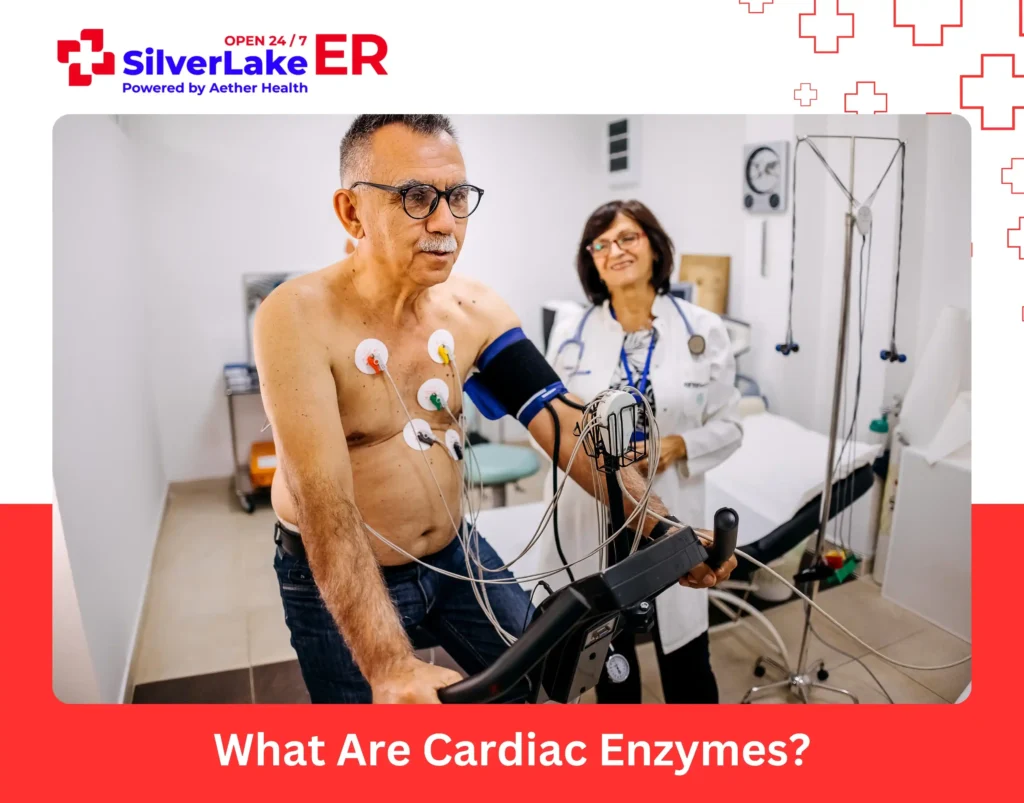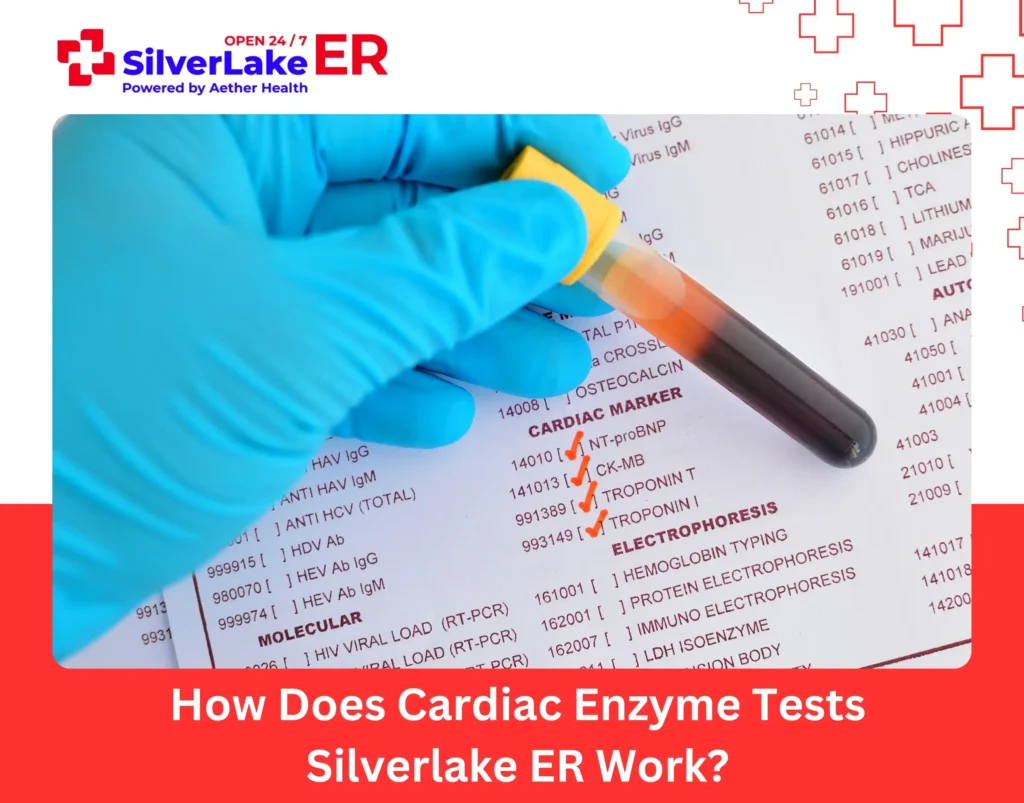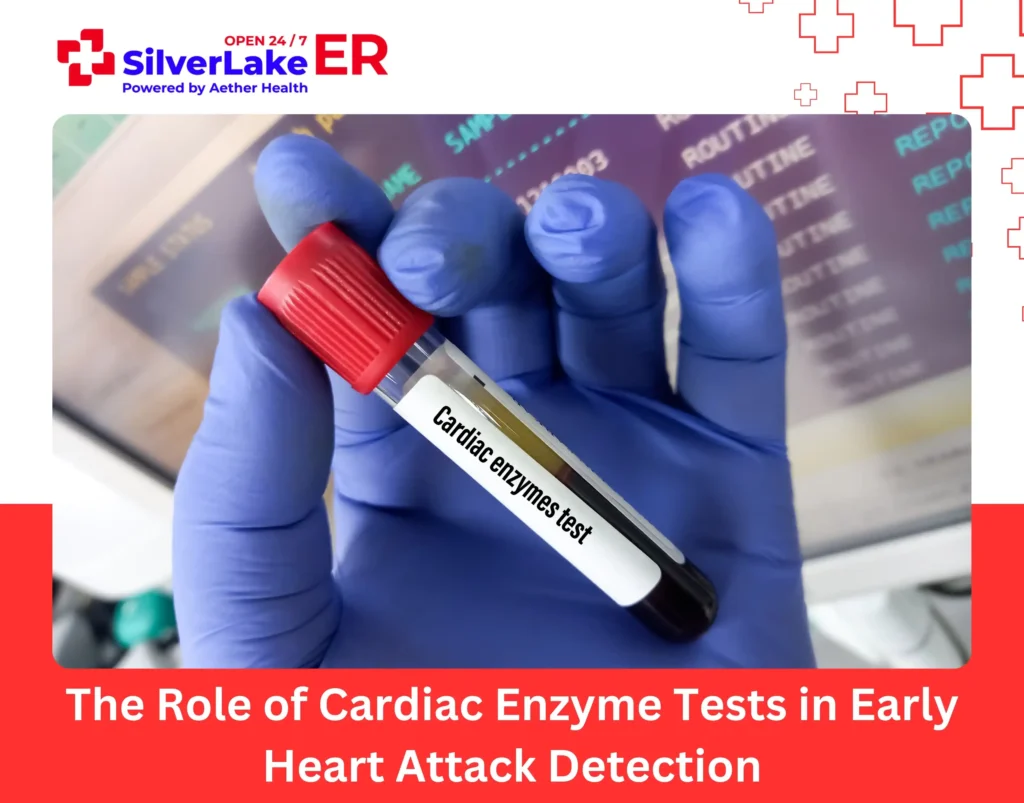Chest pressure, shortness of breath, nausea; you may not realize it is a heart attack. When you reach the emergency room with these symptoms, one of the key tools that detect a heart early is the cardiac enzyme test. This simple blood test reveals life-saving clues within hours.
At Silverlake ER in Pearland, we use cardiac enzyme tests to help catch heart attacks before any significant damage. The faster we detect it, the quicker we can start your treatment, and the better the chance of survival.
Let’s break down how cardiac enzyme tests Silverlake ER work and how we use them to keep your heart safe.
What Are Cardiac Enzymes?

Cardiac enzymes or cardiac biomarkers are proteins inside your heart muscle cells. When the heart muscle gets damaged, like during a heart attack, these enzymes leak into your bloodstream. The most common cardiac enzymes that are leaked include:
- Troponin (Troponin I and T): The most accurate and commonly used enzyme for detecting heart damage. It rises 3–6 hours after damage and stays high for up to 10 days.
- CK-MB (Creatine Kinase-MB): Found in both heart and skeletal muscles, doctors still use it to help confirm a heart attack. It rises 3–6 hours after injury and returns to normal in 2–3 days.
- Myoglobin: Rises fast, often within 1–2 hours after a heart attack starts. This protein is not specific to the heart (can go up from other muscle injuries) but is helpful when used alongside other tests.
Why Is Troponin Testing The Most Accurate Marker of Heart Damage?
Troponin stands out as the most precise indicator of heart muscle injury because:
- It’s super specific to the heart: Unlike other cardiac enzymes , troponin doesn’t get released from other muscles in your body. It lives almost exclusively in heart muscle cells.
- It stays in the blood longer: Troponin levels increase 3 to 6 hours after damage begins, peak around 12 to 24 hours, and remain elevated for up to 10 days. So even if someone comes in late, a heart attack can still be confirmed.
- It shows the full picture over time: Since troponin rises, peaks, and then stays elevated, doctors can track it with repeat tests.
- It guides treatment decisions: The higher the troponin level, usually the more damage there is. That helps doctors decide the appropriate treatment approach.
- It shows how bad the damage is: Higher troponin levels usually mean more serious injury, so doctors may need to act quickly with more aggressive treatment.
- It detects silent heart attacks: Not all heart attacks come with crushing chest pain. Some people, especially women, older adults, and those having diabetes, may have vague or mild symptoms. Troponin testing is sensitive enough to detect subtle heart symptoms.
- High-sensitivity troponin tests (hs-Troponin): Newer high-sensitivity troponin tests at Silverlake ER can detect even tiny amounts of damage within 1–2 hours. This helps us start treatment even faster.
How Does Cardiac Enzyme Tests Silverlake ER Work?

Cardiac enzyme tests at Silverlake ER are vital for rapid heart attack diagnosis. They catch high levels of specific proteins in your bloodstream that indicate heart muscle damage.
Our board-certified emergency physicians order cardiac enzyme tests immediately when you arrive with chest pain, shortness of breath, or possible signs of a heart attack. Here’s what happens at the emergency room:
- Blood Draw: A nurse will take a small sample of your blood from a vein in your arm.
- On-Site Lab Testing: Your sample is analyzed in our on-site laboratory for troponin and other cardiac enzymes. The results are available much faster than typical urgent care facilities.
- Other Heart Tests: Muscle injuries or kidney failure may also raise some cardiac enzymes. Therefore doctors at Silverlake ER use a combination of ECGs and other lab tests to monitor heart condition.
- Repeat Testing: Because cardiac enzyme levels rise gradually after heart injury, the doctor may order another test after 3–6 hours to look for changes and confirm diagnosis.
- Immediate Stabilization: If the cardiac enzyme tests show heart attack signs, we start emergency medications right away to minimize heart damage. Our team will also facilitate transfer to a hospital for specialized cardiac care when needed.
When Should You Come to Silverlake ER for Cardiac Enzyme Test?

The longer the heart doesn’t get proper blood flow, the more damage it takes. That’s why early heart attack detection with cardiac enzyme tests could be life-saving. Please don’t wait to seek immediate care if you notice these symptoms:
- Chest pain or pressure (like something heavy sitting on your chest)
- Pain that spreads to your shoulder, arm, neck, jaw, or back
- Shortness of breath—even if it’s mild
- Feeling lightheaded
- Fatigue or a sense of doom you can’t explain
- Nausea or vomiting
- Breaking out in a cold sweat
Even if the symptoms are mild, you’re unsure, it’s still prudent to get emergency cardiac care.
We’re Here When Your Heart Needs Us
Permanent heart damage can start within minutes. Sadly, most heart attack victims wait seeking emergency care for more than two hours after symptoms begin. This dangerous gap between symptom onset and treatment could cost lives.
Don’t let it happen to you. A simple cardiac enzyme test Silverlake ER often stands between life-saving diagnoses and permanent heart damage.
If you or someone you love ever experiences chest pain or heart attack symptoms in Pearland or the surrounding regions, don’t wait. Call your nearest ER or call 911. The Silverlake ER facility remains open 24/7, so you can walk in any time. No waiting. No referral. Just expert emergency care when you need it.
FAQs
1. Can cardiac enzyme levels be high without a heart attack?
Yes. Conditions like intense exercise, kidney disease, or muscle injury can raise enzyme levels. That’s why our team at Silverlake ER never relies on cardiac enzyme tests alone. We always look at your symptoms, your EKG, and additional tests to make sure we get the whole picture.
2. Do I need more than one Silverlake ER heart tests?
Yes, in most cases. Since enzyme levels change over time, initial tests may look okay.
Our doctors may repeat the test after a few hours to see how your levels are trending. A rising troponin level is often a clear sign of ongoing heart damage. Repeating the test helps us confirm the diagnosis and define the treatment.
3. How fast can cardiac enzyme tests detect a heart attack?
Troponin, the key marker in these tests, usually rises within 3 to 6 hours after heart damage begins. At Silverlake ER, we utilize high-sensitivity troponin tests that detect signs as early as one to two hours. That means we can catch a heart attack early—often before serious damage sets in.




